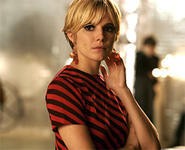That Shreveport, Louisiana, is frequently made to stand in for 1960s Manhattan is the least of the film's problems. Warhol wonks will note dozens of distortions, beginning with the Factory itself. Billy Name -- the man who decorated every square inch of the infamous loft in silver and became its live-in custodian -- remembered it as a dark, dank, menacing place, buzzing with the hive energies of art-making and amphetamine frenzy. The Factory in Factory Girl is much too tidy and bright: a neat pile of Brillo boxes here, a bit of speed-freak goofing over there, random heaps of pseudo-bohemians huffing down helium in fits of giggles.
Primitively written by "Captain Mauzner" (né Josh Klausner) and prosaically directed by George Hickenlooper, Factory Girl sanitizes the Factory era, even as it aims to expose its spiritual grime. The story of Edie Sedgwick is not a happy one. Born into an insanely rich, obscenely dysfunctional clutch of Massachusetts blue bloods, she fled to art school before finding her true calling as an ebullient junkie and archetypal "It" girl. Scenester, tastemaker, one-woman youthquake, and hardcore basket case, she would serve for a brief, blazing moment in the mid-'60s as the Wigged One's most scintillating muse.
Insiders called Warhol "Drella." That's Dracula + Cinderella, though Guy Pearce, in a performance at once overcalculated and underconceived, emphasizes the bloodsucking aspect. He goes deep into Andy's physical strangeness to embody the skin-deep thesis that he compensated for ugliness by leeching onto pretty people. That might well be valid, but it's definitely not definitive. Like everything here, it's a CliffsNotes cop-out.
Mauzner's script isn't quite the work of an "illiterate retard," as Lou Reed says, but it's close. Factory Girl is Edie for Dummies, a simpleminded checklist of biographical tidbits held together by a voiceover of staggering banality. "We were experiencing life on our own terms!" "It was a perpetual party, one that I was happy to lose myself in!" "He was so . . . different!" That last bit concerns what the screenplay, dodging lawsuits, refers to as "the musician": Bob Dylan, whose relationship to Edie is a subject of controversy and who might well have murdered the filmmakers had he seen how heinously Hayden Christensen travesties his mythology.
Miller, meanwhile, works very hard at her Edie. She does the voice and the laugh and the style to a T, though she never nails the ineffable, effervescent vitality. Who could? On the one hand, Edie is a walking cliché: the poor little rich girl who burned bright, then burned out. On the other, she's as enigmatic as Warhol, a white-heat lightning bolt from the zeitgeist, showering the scene with giddy radiance. You need but see her in Vinyl, her Factory film debut, holding down a corner of its deep-space S&M tableau, doing nothing but flicking a cigarette and bopping her head, to get her enchantment. Chief among Hickenlooper's follies is his restaging of Vinyl.
But the director mutilates Beauty #2, the richest of Warhol's cine-interrogations and the apex of Edie's underground superstardom. Plunked on a bed with a chunk of stud named Gino, Edie submits to the offscreen questions of Chuck Wein (a clueless Jimmy Fallon), an old friend of Edie's whose crucial and controversial role in the Factory ecosystem is here glossed over. Factory Girl literalizes the rape scenario implicit in Beauty #2, escalating into the vulgar (and wildly exaggerated) spectacle of Wein forcing Gino on the distressed starlet.
Poor little girl, chewed up in the Factory machinery. It was inevitable, perhaps, that a biopic of the pop princess would stick to pop psychology, but did it have to feel as flat as a silkscreen? With its hackneyed party scenes and jet-set montages, Factory Girl fails even at frivolity.


